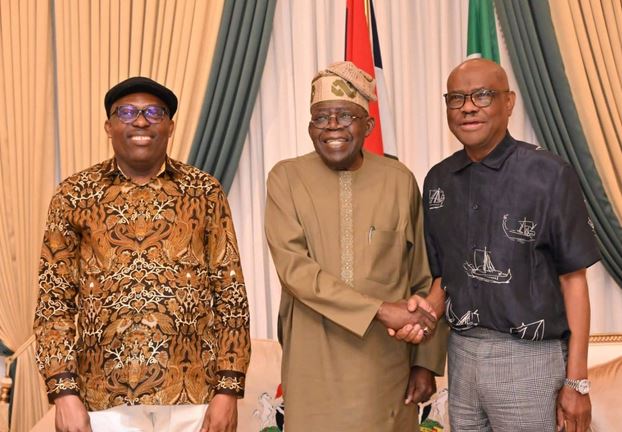A storm of controversy now surrounds the recent political meeting held at the Aso Rock Presidential Villa, where President Bola Tinubu hosted a closed-door session involving the embattled Governor of Rivers State, Siminalayi Fubara; former governor and current Minister of the Federal Capital Territory, Nyesom Wike; and the suspended Speaker of the Rivers State House of Assembly, Martin Amaewhule.
The meeting, which was widely reported as a peace and reconciliation effort, has taken a sharply divisive turn, especially following remarks from Leloonu Nwibubasa, a former Rivers State Commissioner for Employment, Generation, and Economic Empowerment. He has publicly rejected the notion of reconciliation, instead framing the event as a political ambush that left Governor Fubara with little choice but to capitulate.
Sources close to the Presidency have indicated that the discussions ended with Governor Fubara agreeing not to seek reelection in 2027. In exchange, he would be allowed to complete his current term without further political interference. Additionally, he reportedly gave Wike full control over nominations for the 23 local government chairmanship positions across the state.
This arrangement has triggered reactions across Nigeria’s political spectrum. Critics argue that such a deal places the democratic will of Rivers people in jeopardy, reinforcing long-standing concerns about godfatherism and political suppression.
Nwibubasa, speaking to The Punch, questioned the entire premise of the meeting. For him, the governor’s solitary appearance at such a critical discussion was symbolic of defeat, not negotiation.
"What I see is not reconciliation. What I see is a surrender," Nwibubasa declared. "Governor Fubara walked into the meeting without any member of his support team. No deputy governor, no Secretary to the State Government, no Chief of Staff, not even his factional Speaker, Victor Oko-Jumbo. He was alone."
By contrast, Wike was accompanied by a contingent of his loyalists in the House of Assembly and key political allies. This, according to Nwibubasa, reveals a power imbalance so steep that the meeting could not possibly have been conducted on equal terms.
Political observers note that this latest development is yet another chapter in the ongoing power struggle between Fubara and Wike. Their relationship, once seen as a smooth transition from predecessor to protégé, has soured into a bitter contest for political dominance in the state.
The closed-door negotiations at the Villa were supposed to halt the escalating tension in Rivers politics. However, critics believe that the terms of the agreement raise serious questions about democratic governance, political autonomy, and the influence of federal power in state affairs.
A source from within the Presidential circle described the outcome as a "peace deal" designed to restore calm in Rivers. But that calm, according to Nwibubasa, comes at the cost of Fubara’s independence and the state’s political integrity.
He warned, “The political structures, economic structures and realm of leadership of Rivers State have returned to the old order. The people of Rivers must understand that this is not reconciliation. It is domination cloaked in diplomacy.”
Supporters of the peace deal argue that stabilizing the state was paramount and that political concessions were necessary. Still, the idea that a sitting governor would pledge not to seek re-election in return for short-term peace is drawing harsh criticism from various corners of Nigerian civil society.
Several political analysts also question the precedent this may set for governance in other states. They warn that if federal interventions continue to sideline state leaders, democracy could be weakened at its roots.
The next steps for Governor Fubara remain unclear. Some within his camp suggest he may be attempting to buy time while preparing for a political resurgence. Others believe the governor has been politically cornered with little room for maneuvering.
Meanwhile, Wike appears to be strengthening his grip on the political machinery in Rivers. With the nomination rights for all local government chairpersons reportedly handed to him, his influence may once again dominate every level of governance in the state.
As Rivers State absorbs the implications of this deal, one truth stands out amid the political theatre: power in Nigerian politics is seldom balanced, and reconciliation without equity often masks deeper fractures.





![Nollywood Actor Yomi Fabiyi Alleges Mohbad Was Killed, Claims Possession Of Mohbad Murder Footage [VIDEO]](https://blogger.googleusercontent.com/img/b/R29vZ2xl/AVvXsEi7KtFcQiB94_n479AZ0cHJjUPbzu2i-cm5RdthZnGOrJlVJtBrN5F6cHj4QY92cyXfJjTfYBzeHjgTD9oFY9JaxI9LLcFn6bWNfyoznmfdHeG4-BjDu0ILmKjwNiyWjTbSPYdU9xGAw12l7FAaTgliuZJv72qyD25bPY6AWQCTvmQDZsQOBuvluHKPrPif/w72-h72-p-k-no-nu/fabiyi%20o123.jpg)



DSHFJCGHMJH.jpg)
![New Movie Alert! MEETING ALEX - Ik Ogbonna - No #1 Trending Nigeria Movie for May 20TH 2025 [WATCH]](https://blogger.googleusercontent.com/img/b/R29vZ2xl/AVvXsEjqOWIAaFG-HLXopPFh5Vqx0i7qEHJ-B1GzBDhvvEto3eiloVJOd65LiRWNJgTPy5r6z4tOzlH9YT23pruH5mDTj7FfPBa4JwaUxAw4K3HTImdWPuzyrsNGAA9PEtROglMeColWouUoLviS3yZwO_l231n2IkZzNg5wotlic738IYgL3L69PNDrsg0ES60Q/w72-h72-p-k-no-nu/meeting-alex.jpg)









0 Comments
Hey there! We love hearing from you. Feel free to share your thoughts, ask questions, or add to the conversation. Just keep it respectful, relevant, and free from spam. Let’s keep this space welcoming for everyone. Thanks for being part of the discussion! 😊